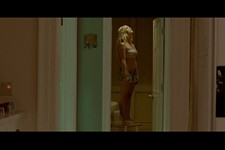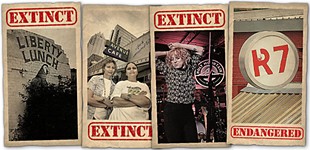The Outlaw
Alex Cox, still shooting film, and the finger, after all these years
By Cindy Widner, Fri., Oct. 22, 2010

Alex Cox is dispatching from deep in the Oregon woods, hunkered away from the light and the madness and cable television. He's been there for some time, lobbing grenades – at the film studios and the banks and the hypocrites and the colonialists – and cobbling together cinematic documents with dust and grit and more than a little wicked humor.
It's possible, of course, that he could make a break, hugging the wall like some pumped-up Bartleby or hurtling slo-mo from a balcony, grabbing a few moments of freedom before he's taken out, suspended briefly in a bright-blue sky as if placed there by Sam Peckinpah himself. The life of a renegade filmmaker is always, as we know, intense.
Okay, a bit of an exaggeration, perhaps – still, it's a fitting scenario for a man who directed four boundary-pushing studio features in quick succession, throwing down visual style and subcultural slyness and balletic violence with the best of them, only to flee abruptly into the indie hinterlands. And he does live in the woods, but (on the phone, at least) Cox is quite jovial, witty, and incisive; in addition to being an unrepentant social critic, he's a man of happy outrage who works outside the studio system (or pretty much any film system) and tends to poke the eyes of the powers that be with a pretty sharp stick, accompanied by a hearty belly laugh. (The Chronicle spoke with him last summer, before an trip to Austin – eventually cancelled – to screen a handful of films at the Alamo Drafthouse.)
It also turns out that, perhaps to the surprise of those who lost track of him after he parted ways with Universal around the time of Walker (1987), he's been quite busy. He's made three feature films in eight years; his 2007 film, Searchers 2.0, releases on DVD on Oct. 26.
When Cox debuted with Repo Man – a sharp, grimly hilarious piece of work that touched on the totems of what was, pre-Internet, truly an alternative subculture (the punk-fueled soundtrack, with songs by the Modern Lovers, Iggy Pop, and, okay, Circle Jerks, didn't hurt) – it seemed like he had arrived fully loaded, equipped to take all comers in the cult-kingpin arena. The lyrical, zeitgeisty Sid & Nancy came next, followed by blown-out, rock & roll-damaged Western Straight to Hell.
It was Walker, an ambitious, magical-realist take on the real-life tragedy of an attempted takeover of Nicaragua by a Vanderbilt-backed Tennessean, that seemed to point the way to the exit. The film's reputation has been redeemed aesthetically and vindicated politically, receiving at last the elaborate Criterion treatment, but at the time, it was seen as a bit of a disaster – a view that overlooked not only its political and cinematic sophistication but its absurdist humanism as well.
"I think liberals" – the persuasion, Cox points out, of most studio suits – "are very fragile, and they like a kind of sentimentalized notion of things," Cox says. "The right way to make Walker would be from the perspective of an honest American journalist, like The Year of Living Dangerously or Salvador. But we didn't do that. Rudy [Wurlitzer] just wrote this script about a whole gang of pirates – the Blackwater of their generation.
"Walker's a story that's been told," he continues, "because it plays into this idea of the renewable innocence of America. In my lifetime, I've heard about America losing its innocence at least six times. Which is quite something. How often can you lose your virginity?"
It's not hard to see why Cox was, as he puts it, "blacklisted" from the studios. Internet rumors about what caused the split abound; while he avers that certain interactions with studio heads "would be a reason" one wouldn't get more studio work, Cox is vague about what, exactly, went down – though he's not shy about calling the studios a "cartel" and insists that it's what happens to anyone working in the business who defies the system in one way or another. "You don't get any more job offers, and you can't work for a studio anymore," he says simply. "They don't actually send you a letter."
"But the other thing is this," he continues. "Just because somebody has loads of money and loads of power and is a big bully doesn't mean we have to accede to their bullying. Part of the greatest fun in life is to be able to say no to people who are more powerful than you."
Speaking truth to power does have its perks, one supposes. And while Cox subsequently disappeared from all but the arthouse radar – as did some of the arthouses themselves – he certainly got on with things, completing a variety of film and television projects that includes a Kurosawa documentary and Revengers Tragedy, a visually arresting film based on the Jacobean play by Thomas Middleton.
His latest, Searchers 2.0 – "not a sequel to the John Ford film," he emphasizes – seems inevitable. A "road story about actors," as Cox calls it, the film follows two codgers (Del Zamora and Ed Pansullo) traveling across the American West with the grown daughter of one of them (Jaclyn Jonet) to confront an old nemesis (Sy Richardson) at a screening – on, um, a traveling, blow-up screen in Monument Valley. Variety calls it "as minimalist and laid-back as Cox's last film, Revengers Tragedy (2002), was overwrought and over-the-top," noting that its charm lies in the ample film geekery on display.
Like many former film students, Cox, a native Briton, is enamored of Westerns, particularly spaghetti Westerns. Unlike most of them, he can articulate the personal reasons for it. "It actually comes from going to an all-boys school. From the age of 11 to 17, I was plunged into a world of arbitrary, macho violence. The spaghetti Western seemed to me to reflect that in an odd way: the really weird world where there were only men and violence could just descend on you at any second from any side. That was why I related to [Westerns] so much, because of the arbitrary and sadistic nature of the world that they portrayed."
The director's politics dovetail with the spaghetti Western in more typical ways as well. "What the Italians did was like what Peckinpah did in The Wild Bunch," he elaborates. "They used Westerns to illustrate larger social themes. Sometimes it might be American intervention in Latin America. It might be a radical retelling of the Kennedy assassination as a cowboy film. They might just be general meditations on human corruption and wickedness. But the best of them really do have an allegorical dimension, and that's what holds them up."
Cox left Westerns behind for a bit in his latest film, Repo Chick (also "not a sequel"), the timing of which is uncanny. "When I was doing research for Repo Man in the early Eighties," Cox explains, "I was riding around in a car with a guy who worked for General Motors Acceptance Corporation. Which was at the time the biggest repo company in the world. A year and a half ago, I realized that one of the prime movers in the mortgage disaster was GMAC. Not only had the repo men caused such misery in a microcosm by stealing the cars of poor people back in the Eighties, but we now had reached the stage where repo men were actually repo-ing houses and throwing people out of their homes. And it just seemed to me to be so poignant."
Regardless of genre, it's the poignance of the little guy's fight that seems to drive Cox – along with his inability to resist hurling punch lines at Goliaths. "Because what else can we do?" he asks, veering into a vaguely Westernish scenario by way of elaboration. "That was the nice thing about being in Mexico in the old days, when they had passenger trains. Balladeers would get on the train, and they would start singing original ballads about Vicente Fox or about Jimmy Carter. It was amazing, because these were really, really poor people who made a living by singing political ballads on the train. And that's what we have, innit? I mean, we're poor, we're powerless, but we can laugh at the people above us. And we can tell stories about them."
Microcinema will release Alex Cox's Searchers 2.0 on DVD and Blu-ray on Oct. 26.












